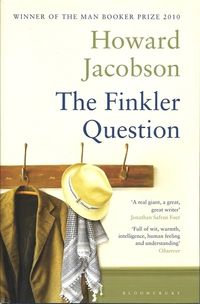The Finkler Question Quotes

"People who see what's coming have faulty chronology, that is all."
"True, he had no calm, but she shattered whatever calm there was to look forward to in the future."
"There was no child. Children spoilt the story."
"It is terrible to lose a woman you have loved, but it is no less a loss to have no woman to take into your arms and cradle before tragedy strikes."
"He felt himself to be a stunted shrub in a rainforest of towering trees."
"The look which people born again into their faith sometimes acquire."
"How do you go on living knowing that you will never again - not ever, ever - see the person you have loved?"
"He could not remember a single morning of his life when he had woken to a sense of possession."
"Was it better then - measuring the loss - not to know happiness at all?"
"No one knew my family. We kept ourselves to ourselves."
"It's a metaphor for your not wanting to know the truth because you prefer to make it up."
"We are the have-everything generation, remember."
"I can't imagine him young. He's like a man who's always been old."
"We don't hit it off especially - I think he secretly prefers my half-brother."
"Let Sam Finkler go with him if he thinks it's such a good idea."
"The question is, why don't you doubt she is, if you have seen nothing to make you suppose otherwise."
"You make the world a sadder place, Julian, and it is already sad enough, believe me."
"Life was a disgrace, an absurd disgrace, to be exceeded in disgracefulness only by death."
"Thou shalt not kill was emblazoned on the hearts of Jews."
"The Holocaust has become a commodity you trade."
"But something of Libor remained harboured there, as he feared that something of his own disgrace still lingered on Hephzibah's terrace though in actual person he had left it."
"Muslims in the morning, Gentiles in the afternoon, Jews at night. Or some other ordering. It didn't matter who got when, only that they all got a part."
"He would send his thoughts out at one end of the park and meet them again at the other, borne along by the otherwise unoccupied trees."
"It was not purposeful thinking, it was just thinking. Reliving himself. Thinking meaning existing in his head."
"Anyone observing him - though no one did observe him, because dog walkers care only for what's at the end of their leads and joggers care only for their heartbeat - would have taken him to be a man in mourning."
"What they would not have known was how much and how many he was in mourning for."
"He'd had a fancy when he'd first taken up with Hephzibah that they would walk together to the lake, sit on a bench for half an hour, watch the herons, talk about Jews and Nature."
"Well, the symmetry was broken now. But in truth it had only ever been Treslove's idea and no one else's."
"So every walk in the park was now a memorial walk to the new life that had not materialised."
"It was noise that must have woken him. A crowd of schoolchildren of all colours and sexes was shouting something he couldn't quite hear."
"'It's a Jew!' they cried. 'It's a Jew!' As though they had made a discovery."
"What Treslove saw in his face was accustomedness."
"Nothing personal, then. It's a freak, it's a Jew. Just whoever wasn't them."
"Not worth anybody dying for. Or was the opposite the truth: Not worth anybody living for?"
"He must have. There was no other explanation. He was not in charge of himself. Things happened to him."
"Rather than be beholden to Sydney, and whatever sickly cause of humane self-abnegation he serves by wreathing himself in the scarf of his people's enemies, Treslove wishes the brakes had not been so good."
"Funny thing, ingratitude, Treslove thinks, closing his eyes again. It's been a long day."
"For Julian, because she cannot in her heart exclude Julian, she cries bitter tears that come from a part of her she doesn't recognise."
"Yisgadal viyiskadash ... It's so all-embracing he might as well be mourning the Jewish people."
"He never really knew Treslove either. And that too strikes him as a reason for lamentation."